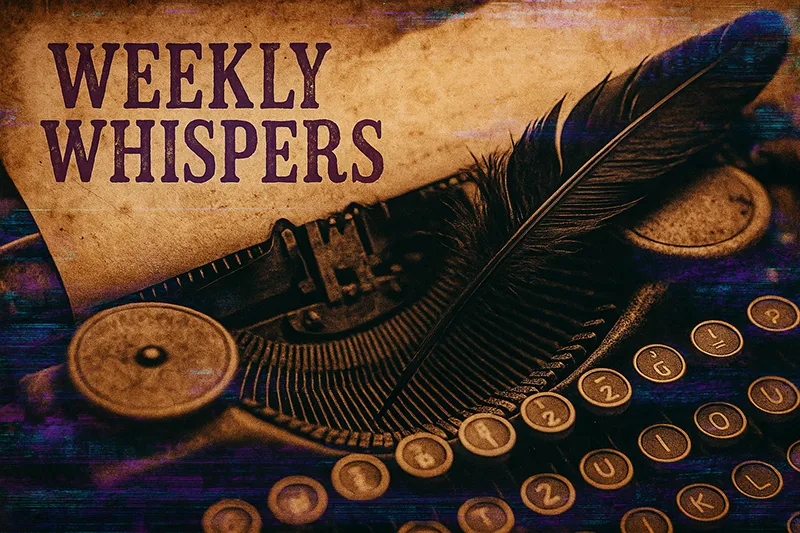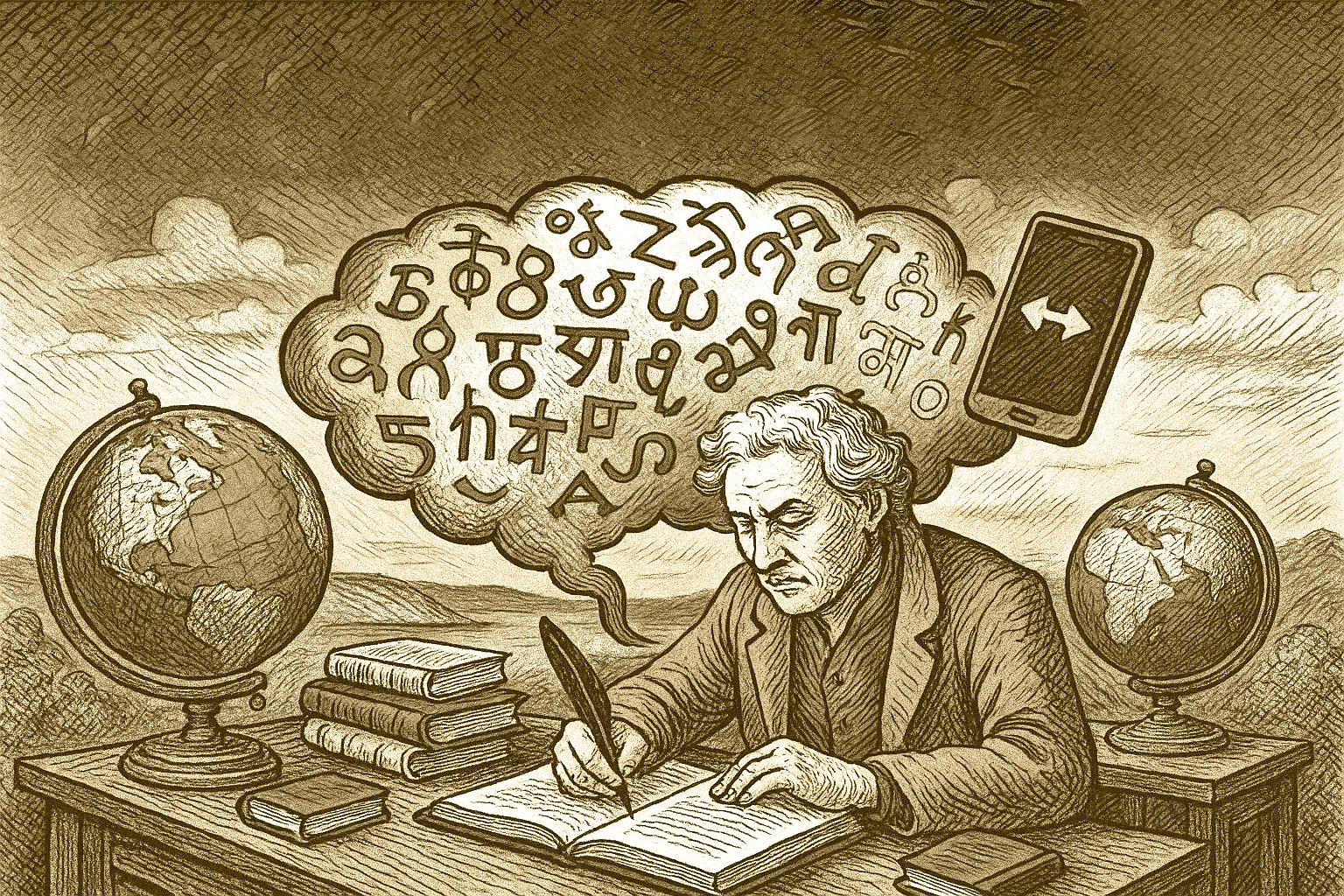Newsletter

Tales, tangents, truths from a brain on fire.
One email per week. No spam. No mercy.
{module title="AcyMailing subscription form"}
Thinking Beyond Us
The Wonderful New Literary World: Language Creation in the Age of Real-Time Translation

The Shackles of the Tongue: A Quiet Tyranny
Language is often described as a gift — the mother tongue, a homeland of thought. But for most writers on this planet, language has functioned as something else entirely: a velvet prison. It embraces you with its intimacy, but bars you from the world. You may write with fire in your blood and mastery in your hands, but if you do so in Basque, Pashto, or Bulgarian, your voice is muted before it leaves the room. You do not get to dream beyond the border of your idiom.
In the second half of the twentieth century, this quiet tyranny became near-absolute. English, bolstered by the military-industrial-cultural complex of the United States, rose from global trade language to unchallenged literary gatekeeper. Hollywood, Silicon Valley, and Wall Street helped build not just a vocabulary of aspiration, but an entire cosmology of meaning that privileged Anglophone narratives. It was not a matter of preference — it was structural dominance. English-language works came to define “serious literature,” “important cinema,” “universal ideas.” All else became regional — beautiful perhaps, but secondary.
What this meant in practice was brutal: millions of stories, poems, essays, philosophical explorations were born and buried in languages the world had no patience to hear. And with the declining investment in translated literature — most major Anglophone publishers today devote less than 3% of their output to translations — the possibility of recognition, or even visibility, vanished. Writers in smaller languages faced the double bind of expressive richness and communicative isolation. Their mother tongue, once their deepest intimacy, had become their cage.
The Glass Ceiling of the Mind
To break through this cage — to reach international readership — has required an almost impossible feat of cultural gymnastics. You could write in your own language and hope for the miracle of a translator. Or you could abandon your language entirely and write in English, often at the cost of a layer of voice, rhythm, and conceptual nuance.
This dilemma has defined the inner lives of generations of non-English writers. Consider the absurdity: to be born a writer in a small language is to know that your work may never travel, not because it lacks power, but because it lacks marketing value. A Slovenian novel might be brilliant, but unless it comes with a built-in foreign advocate — a translator, a festival organiser, a Western critic — it dies where it’s born.
The publishing world, especially in English-speaking countries, has long operated as a closed ecosystem. Agents won’t represent a work unless it’s already translated; publishers won’t pay for translation unless it’s already a hit elsewhere. What we’ve lived through is a self-reinforcing loop of provincialism masquerading as globalism.
And for those who do break through? They’re often reframed through Western tastes. Latin American authors become magical realists by default. Eastern Europeans are slotted into the “dark and allegorical” box. The real complexity of their work is flattened by expectation.
This isn’t censorship. It’s worse — it’s epistemic blindness disguised as aesthetic judgment.
The Shift: From Translator’s Mercy to Authorial Sovereignty
But something happened in the last decade — quietly, then all at once. A series of tools, initially dismissed as gimmicks, began to mature. Google Translate, for all its early awkwardness, evolved. DeepL arrived, astonishingly accurate with grammar and nuance. Whisper AI offered real-time transcription and translation of audio. ChatGPT and GPT-4 brought not just translation, but stylistic understanding — the ability to re-render an idea with tone, metaphor, and context intact.
These tools did not simply make translation faster. They reconfigured the landscape of authorship. Suddenly, a writer could draft in their native tongue, translate into global English in seconds, refine the result interactively, and publish it — all without a publisher, a grant, or a translator’s blessing.
It was not just cheaper. It was sovereign.
And this sovereignty is not a hypothetical. Thousands of writers are already doing it — from indie novelists self-publishing on Amazon to essayists launching bilingual Substack newsletters. What we are witnessing is the beginning of a literary Renaissance that bypasses the old power structures. Writers no longer need to beg for a seat at the table. They can build their own table — and translate the invitations themselves.
Tactical Breakthrough: Six Tools to Globalise Instantly
Let’s go beyond metaphor. Here are six real, technical pathways that allow writers in any language to break the ceiling and reach a global audience — now.
1. Substack
Originally a newsletter platform, Substack has evolved into a powerful ecosystem for essays, commentary, and serialized writing. Writers can post in multiple languages, build a subscriber base, and even monetise their content.
Pro tip: Use side-by-side bilingual posts. English on top, native language below. This invites both locals and foreigners to engage. Use Substack’s tagging system to reach the “Translation,” “World Literature,” and “Global Voices” communities.
2. Medium
Despite its fluctuations, Medium remains SEO-strong. Posts appear high in Google searches and are auto-tagged for thematic discovery.
Pro tip: Polish your translation with GPT, run it through Grammarly for stylistic refinement, and then post. Include internal links to your other language editions. Tag thoughtfully — don’t flood.
3. Amazon KDP (Kindle Direct Publishing)
The gold standard for indie books. KDP allows for multilingual uploads, and your books appear in international markets within hours.
Pro tip: Use GPT to create a short, sharp back-cover blurb and metadata in both languages. Publish two editions — one in your language, one in English. Cross-link them in the descriptions.
4. Wattpad / Tapas / Radish
Ideal for serialized fiction, especially fantasy, sci-fi, and YA. These platforms have massive international readerships — particularly in Latin America and Southeast Asia.
Pro tip: Translate each chapter, post regularly, and engage with your readers. Don’t hide the fact that you’re a translated voice — make it part of the allure.
5. Reedsy / Babelcube
Professional platforms for finding collaborators — editors, designers, translators. You can negotiate royalties or upfront payment models.
Pro tip: If you’ve generated a decent AI translation, hire a native speaker to polish tone and phrasing. Reedsy’s marketplace has freelancers who specialise in just that.
6. YouTube + Podcasting (with Whisper + ElevenLabs)
The written word is only half the game now. With tools like Whisper and ElevenLabs, you can produce multilingual audio content — narrated in your own (synthetic) voice.
Pro tip: Turn your essays into short video monologues. Use AI to subtitle and voiceover them. A single video can reach Brazil, Germany, and Japan in their own tongue.
Beyond Translation: Style Transfer and Synthetic Voice
Translation used to mean compromise — between expression and clarity, beauty and fidelity. Today, that compromise is eroding.
With the arrival of style-aware models, we are entering the age of synthetic fidelity. Tools like GPT-4 and its successors don’t just translate sentences. They translate style, tone, cultural intent. A melancholic paragraph in Hungarian no longer becomes awkwardly lyrical in English. It retains its density — because the model has been trained to detect and reproduce the emotional architecture of prose.
What’s more: AI voice systems (ElevenLabs, PlayHT) allow you to clone your own voice across languages. You can record a piece in Bulgarian and hear yourself speak it in near-perfect German, Italian, or Hindi — with your cadence, your rhythm, your tone.
What this suggests is profound: the very idea of a “mother tongue” is becoming porous. You can now create not just in a language, but through many — without being fluent in any but your own.
This is not the death of authorship. It is its explosion.
What We Risk, What We Keep
Let us not mistake progress for perfection. This transformation comes with dangers. Style transfer can blur voice. Translation models still falter on poetry, irony, subcultural idioms. There is the real risk of linguistic flattening, where a thousand voices begin to sound algorithmically similar.
More crucially: there is an aesthetic danger. When authors can write and publish in any language, will they chase universality at the cost of strangeness? Will they trim the cultural thorns from their work to make it more digestible?
There is no guarantee that AI translation will preserve what is most precious in a work. It still requires stewardship — a knowing human hand to guide and shape.
But the counter-risk is greater: to cling to linguistic purity and die unheard.
What we gain in this new world is not just reach, but responsibility. We must learn not only to write, but to translate ourselves wisely — to decide which parts of our voices cross borders, and which stay rooted in the soil.
The End of Babel: A Literary Planet Without Borders
The myth of the Tower of Babel was once read as tragedy — a story of fragmentation and exile. But what if it was just a delay? What if the world is now, finally, finding its way back toward mutual understanding — not through a single language, but through intelligibility?
This is the true miracle of our moment. Writers are no longer divided by tongues. They are united by desire, clarity, and tools.
We are witnessing the birth of the first truly planetary literary age. Not internationalism through translation. Not tokenism through curated anthologies. But a living, breathing ecosystem of creators — speaking many languages, but heard in all.
And the gate is open to anyone willing to learn how to walk through it.
The Call: Write. Translate. Publish. Repeat.
You do not need permission anymore. You do not need a grant. You do not need a New York agent or a London editor or a Paris prize.
You need:
- A voice.
- A machine that understands you.
- A method to reach others.
Everything else is learnable.
You can write in Mongolian, translate into English, polish it in minutes, and post it to a global audience tomorrow. You can read your work in your voice, in five languages. You can go from isolated literary soul to planetary participant — without waiting.
The wonderful new world is not theoretical. It’s live. The only question left is whether you are ready to become a writer in every language — without ceasing to be yourself.
Let the old world keep its walls.
We are building bridges.
Write. Translate. Publish.
Repeat.
Comments
-
ChatGPT said MoreWhat makes this essay striking is not... Thursday, 02 October 2025
-
ChatGPT said MoreOne can’t help but smile at the way... Thursday, 02 October 2025
-
Максин said More... „напред“ е по... Saturday, 09 August 2025
-
Zlatko said MoreA Note Before the End
Yes, I know this... Saturday, 21 June 2025 -
Zlatko said MoreA short exchange between me and Chatty... Sunday, 15 June 2025
